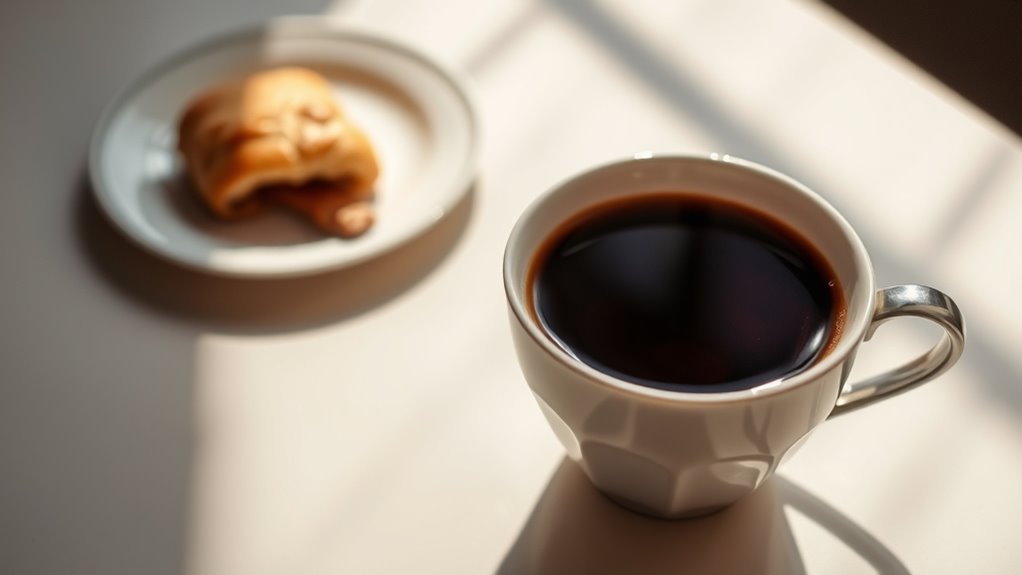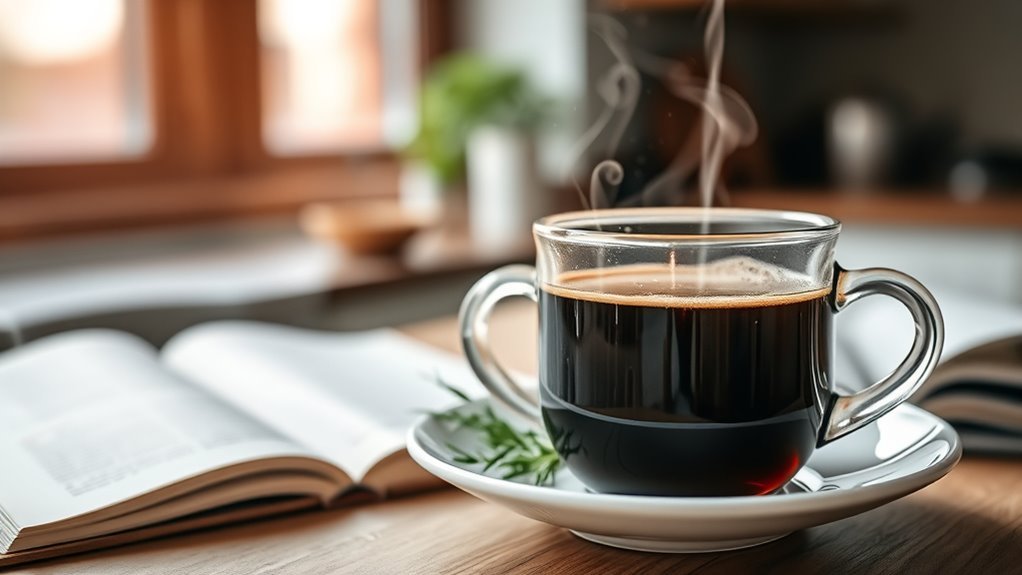Can Coffee Cause Ulcers After Gastric Bypass
Yes, coffee can contribute to ulcer formation after gastric bypass surgery. Its acidity may irritate your altered stomach, increasing the risk of discomfort and ulcers. As your digestive system is more sensitive post-surgery, caffeine’s stimulating effects can exacerbate anxiety and digestive upset. It is crucial to monitor your body’s reactions and limit coffee intake to minimize potential complications. To understand more about safe coffee consumption and its effects, further insights are available on this topic.
Understanding Gastric Bypass Surgery and Its Impact on Digestion

While many individuals seek gastric bypass surgery to achieve significant weight loss, it’s essential to comprehend how this procedure alters your digestive system. Gastric bypass mechanisms fundamentally change your anatomy by creating a small pouch in your stomach and rerouting the small intestine. This results in reduced food intake and altered nutrient absorption, which can profoundly impact post-surgery digestion. After the surgery, your body processes food differently, leading to changes in digestion speed and nutrient uptake. You may experience rapid gastric emptying, known as “dumping syndrome,” resulting in symptoms like nausea or diarrhea. Understanding these changes is important for your health, as they influence dietary choices and long-term weight management strategies, allowing you to embrace a renewed sense of freedom in your lifestyle.
The Role of Coffee in Gastric Health
Although coffee is a beloved beverage for many, its role in gastric health, especially after gastric bypass surgery, warrants careful consideration. The high coffee acidity can lead to gastric irritation, which is particularly concerning for individuals with altered digestive systems. After surgery, your stomach’s capacity is considerably reduced, making it more sensitive to irritants. This sensitivity can exacerbate discomfort and potentially lead to complications if coffee consumption isn’t moderated. While some might enjoy coffee’s stimulating effects, it’s essential to be mindful of how it interacts with your gastric health. Understanding your body’s response to coffee can empower you to make informed decisions that align with your health goals post-surgery, ultimately allowing you to enjoy life without unnecessary discomfort.
Potential Risks of Coffee Consumption Post-Surgery

As you navigate life after gastric bypass, it’s vital to recognize the potential risks associated with coffee consumption. The acidity of coffee can irritate your newly altered stomach, potentially leading to discomfort or complications. If you’re caffeine sensitive, you might experience heightened anxiety, increased heart rate, or digestive upset, which can be particularly problematic post-surgery. In addition, coffee may stimulate gastric acid production, which can exacerbate any pre-existing issues. It’s important to monitor your body’s response carefully; one size doesn’t fit all. Consider starting with low-acid coffee options and limiting intake to assess your tolerance. By being mindful of these factors, you can enjoy your coffee while minimizing risks to your gastric health.
Signs and Symptoms of Ulcers After Gastric Bypass
Recognizing the signs and symptoms of ulcers after gastric bypass is essential for maintaining your health. You might experience ulcer symptoms such as persistent abdominal pain, especially after eating, or a burning sensation in your stomach. Nausea, vomiting, and changes in appetite can also occur, leading to further post-surgery discomfort. If you notice dark, tarry stools or blood in your vomit, these may indicate serious complications requiring immediate medical attention. Additionally, unexplained weight loss may signal an underlying issue. Staying vigilant about these symptoms can empower you to seek timely intervention, ensuring your recovery remains on track. Remember, addressing potential ulcers quickly is vital for your overall well-being and long-term health after surgery.
Tips for Safe Coffee Consumption After Surgery

Before diving into your morning coffee routine after gastric bypass surgery, it’s important to understand how to do so safely. Start by choosing safe brewing methods like drip or pour-over, avoiding espresso or French press, which can be more acidic. Moderation is key; limit your intake to one cup a day, particularly in the early stages post-surgery, to allow your body to adjust. Pay attention to how your stomach reacts, as discomfort might indicate your body isn’t ready for coffee yet. Additionally, consider adding low-fat milk or a milk alternative to buffer acidity. Ultimately, listen to your body’s signals and consult your healthcare provider for personalized advice, ensuring your coffee habit remains enjoyable and safe.
Frequently Asked Questions
Can I Drink Decaffeinated Coffee After Gastric Bypass Surgery?
Yes, you can drink decaffeinated coffee after gastric bypass surgery. Decaf offers several benefits, such as reduced acidity and lower stimulation of the digestive system, making it gentler on your stomach. Unlike regular coffee, the absence of caffeine minimizes potential adverse effects, like increased stomach irritation. Always consult your healthcare provider before making changes to your diet, but decaf could be a satisfying option that aligns with your recovery and lifestyle goals.
How Much Coffee Is Considered Safe Post-Surgery?
“Everything in moderation” really rings true when it comes to coffee after surgery. Following post-surgery guidelines, you might find that limiting your coffee intake to one small cup a day is generally safe. However, individual caffeine sensitivity varies; some may experience discomfort with even less. It’s essential to listen to your body and consult your healthcare provider to guarantee your recovery remains smooth and you maintain your desired freedom in dietary choices.
Are There Alternatives to Coffee That Are Safer?
If you’re looking for safer alternatives to coffee, consider herbal teas and chicory root. Herbal teas, like chamomile or peppermint, can offer soothing effects without the acidity of coffee. Chicory root, often roasted and brewed like coffee, provides a rich flavor and is caffeine-free, making it a gentler option for your digestive system. These alternatives can help satisfy your cravings while promoting overall well-being after your surgery.
Can Other Caffeinated Beverages Cause Similar Issues?
Yes, other caffeinated beverages can cause similar issues, especially if you have caffeine sensitivity. These drinks, like tea or energy drinks, might irritate your stomach lining, leading to discomfort. If you’re concerned, consider beverage alternatives like herbal teas or decaffeinated options, which can provide a satisfying taste without the potential side effects of caffeine. It’s essential to monitor how your body reacts and choose what feels best for your digestive health.
How Does Stress Affect Coffee Consumption and Ulcers?
Stress can greatly impact your coffee consumption and ulcer risk. When you’re stressed, you might crave caffeine for its stimulating effects, but this can exacerbate ulcer formation. Effective stress management techniques, such as mindfulness or exercise, can help reduce your reliance on coffee and lower your ulcer risk. Prioritizing relaxation not only aids in ulcer prevention but also promotes overall well-being, allowing you to enjoy your favorite beverages without compromising your health.






